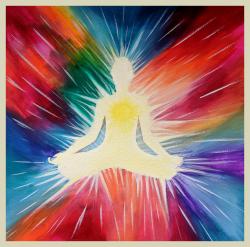A Higher Level of Conscious Engagement

Painting by Rupali Bhuva
We live in an age of spiritual smorgasbord: People are mixing concepts, aphorisms, and insights from a broad variety of mystical and faith traditions. A blend of notions culled from many spiritual paths is now surfacing as popular prescription for all and sundry seekers: “Believe everything will turn out perfectly”; “deny the power of the negative by emphasizing the positive”; “always trust your intuition”; “focus on being and becoming over doing or engaging in activism”; “don’t get caught up in the world of forms and illusion”; “live in essence.” Such a list is clearly a simplistic reduction of the requirement of spiritual practices that are designed to transcend the limits of the ego.
A superficial mysticism is now being applied as broader social commentary. Rumi is on everyone’s lips: “Out beyond ideas of wrongdoing and rightdoing, there is a field. I’ll meet you there.”
Such a pronouncement raises moralists to their feet to make us aware that Rumi’s words may hold a kind of psychospiritual truth but are no basis for creating a morally enlightened society. The moralist is quick to nail the consequences of our choices. We are urged to remember that our choices can be highly creative or deeply damaging to social order and communal life. Our choices can be a curse or a blessing in the lives of others and for the life of the planet. Moral activists urge us to develop the will to consciously set values, codes, and laws, and to adhere to them.
Social activists, on the other hand, will often remind us that progress is not guaranteed, and that it is incomplete in many arenas. They also remind us that there is a constant need to struggle against narrow self-interest and even regressive forces that seek to roll back gains made by previous generations. They spur our conscience to remain vigilant and plead with us to give our attention to everything from poverty to pollution. Activists are sometimes harshly judged for being overly concerned with deficiencies and inadequacies in social and political systems, and are viewed as too negative or coming from a “scarcity”consciousness. But the reality is that they are trying to grab our attention, and have us focus on concerns that have fallen off the radar screen of our awareness.
The challenge for both moral and social activists is to avoid getting spun out by the need to change dysfunctional human behaviors and unjust systems. They should seek to avoid corrosive judgmentalism: When exuberance for justice leads to the demonization of others, more injustice is being perpetrated. Constant unresolved anxiety, frustration, anger, and even outrage can lead not only to burnout, but to a fixation on the externals of the problem. The attention of the activist can get trapped in the field of action and disconnected from the nurturance of being itself.
Likewise the challenge for the spiritual seeker is to avoid becoming self-absorbed. As the Dalai Lama has pointed out, it is not enough to meditate and to develop compassion for others, one must act.
Robust action can be surrendered to the highest principles of love, forgiveness, and reconciliation as Gandhi and others have demonstrated. These exemplars of higher consciousness have paved the way for a more universal shift in human consciousness. To stand in the fires of hostility, exploitation, and hatred with a stance that is both deeply compassionate and spiritually detached, and at the same time generative of creative and enlightened action, is now the task of the globally conscious citizen.
We can increase our inner strength to make critical choices for ourselves and for the planet by refraining from cluttering up our lives with too much superficial choice. The choice to surrender to higher guidance, to listen deeply to one’s inner voice and soul’s beckoning, is not passivity, but a higher level of conscious engagement.
***
For more inspiration, consider applying for an upcoming Laddership Pod, a three-week global peer-learning lab for values-driven changemakers. More details here.
James O'Dea is an author of several books, former President of IONS and Washington Director of Amnesty International. For more, here's a recent conversation with James.
SHARE YOUR REFLECTION
2 Past Reflections


On Mar 3, 2023 Margaret wrote:
2 replies: Margaret, Pat | Post Your Reply

On Mar 3, 2023 Doris Fraser wrote:
Post Your Reply